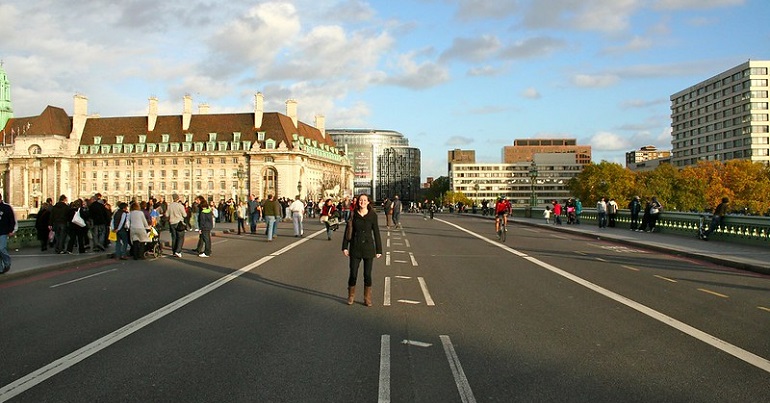Councils must do more to make our cities car-free

In January this year, myself and my Green colleagues put forward a proposal to Brighton and Hove City Council – calling on them to consider the possibility of implementing a car-free city centre in Brighton and Hove by 2023. It was successful – and we’re now due some details on how this could work, including how residents and blue badge holders will be accommodated under any proposals.
The global pandemic has caused grief and suffering across the UK and wider world and led to unprecedented changes to our daily lives. One of the impacts of Covid-19 has been largely car-free roads in Brighton and Hove, a situation which none of us could ever have imagined a few short months ago. However a global pandemic is not what should have brought about this transition. We know about the benefits of clean air, access to open space and safer roads – and surely few will want to ‘go back to normal.’
The impact of road closure
Almost overnight, our roads completely changed. Here in Brighton and Hove, the council decision to close one road – Madeira Drive – was welcomed across the city and demonstrated the multiple benefits of road closures.
With our exercise then limited to an hour per day, the joy of reclaiming roads as public space has become obvious.
It is now possible to walk in the middle of the road, and the need to practice social distancing has often made this a necessity. During this period of lockdown, cycling has suddenly become safer and more enjoyable, even for families with young children. There is suddenly more space for people to walk and run. Everyone’s eyes have been opened to the improved air quality due to a reduction in motor traffic.
Even with lockdown restrictions lifted – it’s clear that reducing our reliance on private car use will continue to reap rewards. Road closures also draw us closer to our city’s goal of reducing toxic emissions by 2030 – the year scientists have warned of catastrophic climate chaos, if we fail to take action now.
It shouldn’t take a pandemic
Restrictions on social distancing and concerns for our safety during this coronavirus outbreak has brought these issues to the fore, but it is a shame that it’s taken a global pandemic to see action that would benefit us all long term.
Despite global concern about climate change, our fear is that decision makers have been too slow to react to the rapidly increasing public appetite when it comes to further road closures and traffic reduction measures.
The Government’s £2billion investment into active travel is welcome, and a testament to the campaigners that have been making the case for this investment for years. However, this will not be enough for local authorities to overturn the years of under-investment when it comes to safe cycling and walking infrastructure. Grant Shapp’s claim that it is a ‘civic’ duty to avoid public transport must be met with real investment that does not lead to a boom in car use as a result of driving being the only safe option.
The climate emergency has not paused, and it is important that as we emerge from the coronavirus crisis that we maintain our focus on avoiding climate breakdown.
Road closures must be a key part of the ‘just transition’, an idea that advocates for the transition to a low carbon economy to incorporate social justice and improving quality of life for all. Fundamentally, we need to support changes that mean people can get what they need without always needing to fork out for a private vehicle: strengthening neighbourhoods, community networks and the incredible surge in volunteer support that has taken root across the country. This notion must prevail as the council draws up its recovery plan as we slowly emerge from the COVID-19 lockdown. We need these changes that we have seen with our roads to last beyond the pandemic.
PS. Bright Green has big plans for the future, but we need your input. Take 2 minutes to see what we’re planning and tell us your thoughts.
Image credit: Sam Sharma – Creative Commons




Leave a Reply